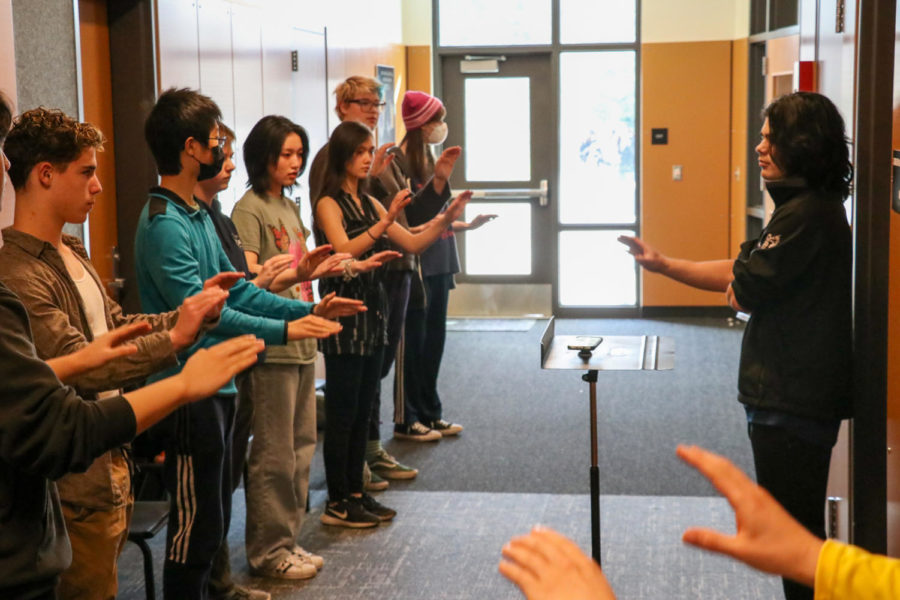In the Northshore School District, students are required to earn four years of English credits. Compared to other classes, English yields many more discussions about personal and challenging subjects through narrative-type writing assignments and literature analysis, which is difficult for some students who feel that teachers don’t warn them properly about potential triggers within the content of their assigned reading.
Freshman Ellen Lowe (she/her) said one of her assignments this year was to write an argumentative essay against gun violence. She said that in preparation for the assignment, the class listened to a podcast that contained audio from a real school shooting.
“[Our teacher] probably could have asked people like, ‘Is this a trigger for you or whatever?’ or just used a podcast that didn’t have audio from a school shooting,” said Lowe.
Senior Devon Meeker (he/they) agreed that teachers’ lack of trigger warnings can be extremely harmful. He mentioned that in IB English 11, students read “Beloved” as part of the curriculum. The novel explores slavery’s legacy after the Civil War and contains many instances of sexual violence.
“One of my close friends actually went through sexual assault few years ago, and there wasn’t a trigger warning when they read “Beloved.” And that really scarred them because they were still recovering,” said Meeker.
While some students argue that teachers should give clear trigger warnings, they also accept that discussing and exploring heavy topics is important. Senior Ellie Weibel (she/her) added that due to the quick pace of IB classes, these topics often can’t be explored thoroughly.
“If anything, I feel like we could have dug deeper into more of, ‘Hey, this is an important topic and we should discuss it’, but we should discuss it right. But due to the fast pace of the curriculum, we can’t, really,” said Weibel.
Meeker added that they believe difficult topics need to be properly addressed since the benefits outweigh the drawbacks.
“I believe it’s important and healthy to talk about things,” said Meeker. “Because if you don’t teach people about it, you’re not going to really know.”
English teacher Charles Trafford (he/him) expressed that above all, students should decide what’s worth discussing.
“You can keep topics away from people, but allow them to choose how far they would like to engage with that and still be successful,” said Trafford.
Students are often expected to write about their own personal experiences in writing pieces like essays or journal entries. However, some think that these pieces can get too personal.
“We did vignettes earlier this year, and definitely when we were doing that, I felt like I had to find something personal,” recalled Lowe. A vignette is a short literary sketch of a brief instance. “There’s definitely a lot of stuff that I did not want to share. So then I just didn’t end up writing about that. I just had to choose a much lighter topic just because I wasn’t super comfortable with personal stuff.”
In contrast, Meeker feels that being forced to overshare isn’t a prominent issue in his own experiences in IB English classes.
“It’s kind of hard for me to remember specific assignments, but it seems like they’re generally based around texts that we’ve read and then comment on, so less like our personal experience,” said Meeker.
Senior Arvin Shrestha (he/him) recently completed two long-term units in his IB English class — one where he had to create an advertisement and the other focused on the IB HL essay.
“It depends on the kind of question he asked because, for the ad unit, my personal experience didn’t really matter,” said Shrestha. “But for the HL essay, it kind of did somewhat matter, but not as not as much as I thought it would.”
These classes all cover a variety of personal or sensitive topics, but each teacher presents warnings for such discussions differently. Some topics that have been touched on in classes include racism, school shootings, sexual assault, misogyny, violence, religious discrimination and homophobia.
“And I don’t want students to feel as though they’re put on a spot. I don’t think that that’s fair. And I think that makes people feel very uncomfortable. And I really understand,” said Trafford.
In a class full of difficult topics, the English department strives to emphasize the importance of feeling secure in the classroom.
“Being safe is the number one thing,” said Trafford. “You need to feel like you’re safe and not feel like you come into a classroom and somebody has already identified you as like, whatever.”


















